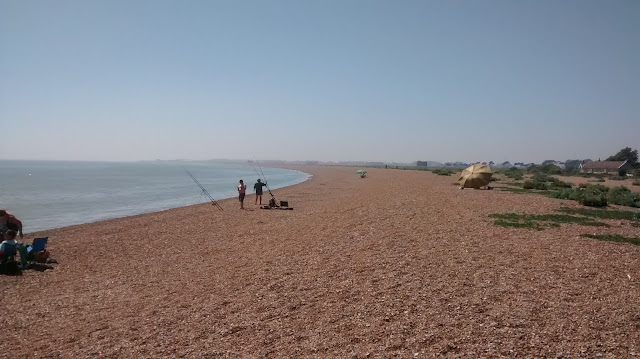We managed to get on the road by 10.15am, which these days is good going having now lost any sense of the morning urgency we used to get from chivvying kids to school and rushing to get to work on time. Ah, the joys of worklessness! We needed to contact our youngest to find out when she was planning to come home, other than that we had no need to rush back north, or rush anywhere at all.
Mobile phone coverage in this part of Suffolk is somewhat intermittent so we headed for Woodbridge hoping for a better signal in town. The couple camping next to us in their rather fine 1978 VW camper had assured us that parking for motorhomes in the Budgen's car park was easy. It probably was for a VW camper, but I made the fatal error of entering the car park without ascertaining how easy it was to exit it. It soon became clear there were no pull through double parking bays available and the space between end parking bay and the supermarket wall looked a little bit of a tight squeeze for a 7m van. Thankfully people were very understanding as I slowly backed up to make my exit through the entrance, and one car driver gave a thumbs-up sign as I reversed gingerly into the corner, watching Gill making windmill gestures in the wing mirror to ensure I did not collide with a trickily placed lamp-post. People do seem very relaxed around here, laid back and not given to impatience or petty annoyance. It's refreshing.
With no idea where we might stay tonight we trundled through Rendlesham Forest heading for Orford, which had been recommended as a good place to stop for lunch by a chatty local we met yesterday. Mysteriously we wafted into a stretch of good 3G and managed to speak to Laura. We discovered she had managed to get a job in a sushi restaurant in Soho for the summer so would not be coming home after all. However, she needed her passport and NI number urgently; these were at home, so we were going to have to head back today after all. We agreed, Orford for lunch, then up the A14 northwards was going to have to be the plan
Orford is lovely. A big village of rust coloured brick houses centred around a market square with a flint church on one side and the ruins of a castle on the other. The quayside, opposite the shingle island of Orford Ness, is a few minutes walk from the centre and has lots of fishermen's huts, still used by fishermen, some good looking fish restaurants and small wholesalers selling shellfish products. It's the kind of place you imagine Rick Stein getting very excited about.
Gill decided that if we could not stay in Orford we would take some of it home to eat this evening. She started to dream-up a recipe using local white fish - preferably cod if possible. Sadly, Pinney's, the fish merchants had no fresh fish left, only smoked - this was not what Gill was after, so we decided to hunt out something for lunch instead.
Foraging for lunch proved much more successful. The products in the local craft bakery were superb, pricey, but delicious. As Gill observed, Mary Berry would have approved, not a soggy bottom to be seen. We bought a ham and cheese tartlet, a creamy feta croissant, and two small 'Portugese flans' for pud, then, to take home a gorgeous seedy loaf. I cannot remember having tasted better pastry products in the UK. Somewhere in the blog we describe a semi-divine moment in a small pasticceria next to the Theatre Pinandello in Agrigento, but the products in the Pump Street Bakery were just as good.
The disappearence of local bakeries and the their replacement on our high streets by the dreaded Greggs is just one example of the way we seem to have accepted that all we deserve is second best. 'Every little helps' has become a curmudgeonly national aspiration. Talking of Tesco, we stopped briefly at the store in Kettering on the way home. Stacked up in the aisles, by the fruit and veg, were cardboard boxes of various products with an understated, badly designed logo on the side - 'Nightingale Farm', as if the store had begun, like some French Hypermarkets, to stock locally sourced produce. Closer examination of the actual produce revealed that it had been imported, mainly from Holland. 'Nightingale Farm' was just another Tesco brand, and the faux rustic packaging and labelling simply a tiresome marketing strategy. Sometimes you do begin to believe the French theorist Braudilliard who asserted that reality has been replaced by simulation. What I don't accept is his belief that we have no choice in this. Even if 'authenticity' is a socially constructed myth, then surely we have the choice to adhere to that rather than the simulcra that allegedly replaced it, especially when the 'authentic' tastes as yummy as Pump Street Bakery's Portuguese flan.
e
e





















































